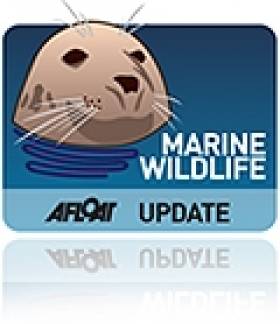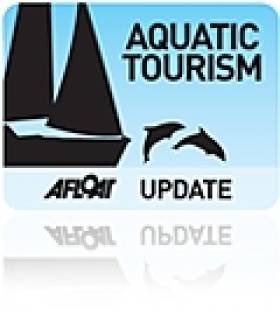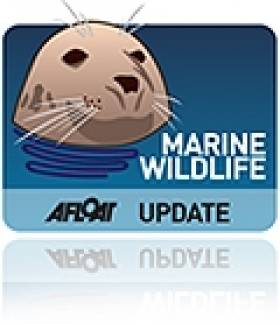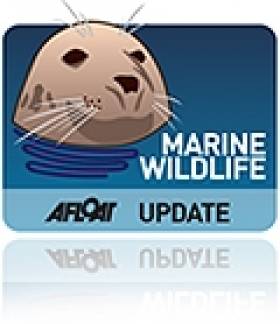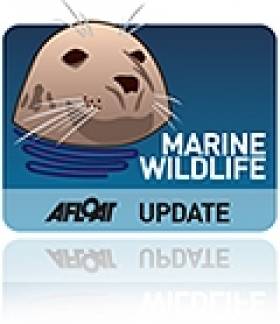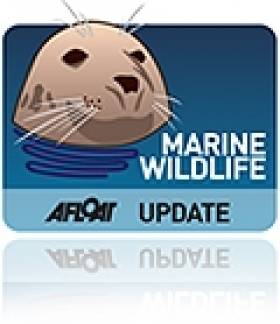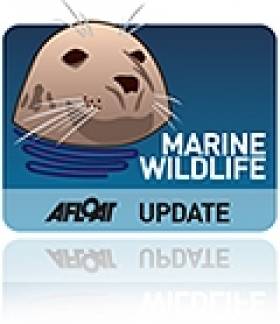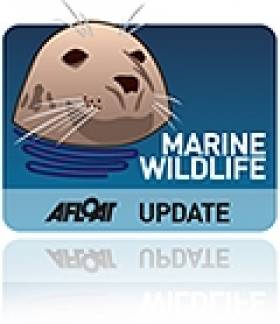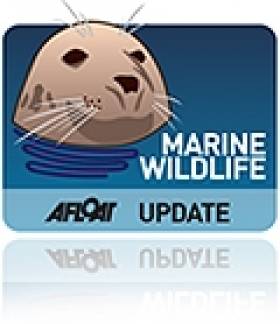Displaying items by tag: Whales
Second Fin Whale Stranding for Sligo
#MARINE WILDLIFE - Sligo County Council is considering its options for disposal after the county's second whale stranding of the winter, when a 60ft male fin whale was beached at Agharrow.
A spokesperson told the Sligo Champion that the whale was in an area known locally as Staid Abbey, lying on a smooth rock ledge that slopes down towards the sea, and is a difficult point to access - particularly in the present stormy conditions.
As previously reported on Afloat.ie, a whale carcass was washed up at the end of last month not far from Agharrow at Raughley. The Irish Whale and Dolphin Group (IWDG) has confirmed that this was the first validated stranding recorded of a fin whale in Co Sligo.
That whale had its flesh removed for fertiliser, while its bones were studied by PhD students from NUI Galway ahead of being buried in a nearby field to allow for the natural decomposition of remaining flesh before future preservation.
Public Needed to Help Record Whale and Dolphin Strandings in UK
#MARINE WILDLIFE - Some 46 reports of stranded whales and dolphins in Northern Ireland are among the thousands recorded across the UK over the last six years, according to BBC News.
A new study co-ordinated by the Zoological Socoety of London (ZSL) shows that some 3,500 cetaceans were stranded on the British coastline between 2005 and 2010.
Though year-on-year figures have fallen overall, is presumed that many more strandings have gone undetected.
Many were found to have died of disease or starvation – particular harbour dolphins.
But human activity such as fishing, shipping and chemical pollution also poses a significant threat to marine wildlife in the waters around the British Isles, said Rob Deaville of the ZSL.
The public is being encouraged to report stranded marine mammals to help create a more accurate picture.
BBC News has more on the story HERE.
Cork The Place to Be For a Holiday On The Sea
#TOURISM - Winter might be upon us, but it's a great time to plan a new year holiday in Ireland on the sea, according to the UK's Daily Echo.
From night-time paddling in with renowned kayaking instructor Jim Kennedy, to snorkelling in Baltimore, relaxing in Skibbereen and and fresh seafood lunches in Kinsale, a vacation in Cork can appeal to any taste.
Whale and dolphin watching is a big draw for the region, too, as Ireland's coast – the first cetacean sanctuary in Europe - plays host to a growing variety of species.
The summer feeding grounds off the southern coast are particularly busy, and tourist boats are often treated to whales breaching the surface and surrounded by dolphins putting on a show.
The Daily Echo has more on the story HERE.
Fin Whales Could Be Wexford Bound
#MARINE WILDLIFE - The Enniscorthy Guardian reports that the fin whales that have been sighted off Tramore in recent weeks may soon make their way towards the Wexford coast.
Afloat.ie recently reported that Waterford was the 'best place to be' for whale watching, with the Irish Whale and Dolphin Group (IWDG) confirming fin whale sightings along a 20-mile stretch from Stradbally to Brownstone Head.
Cetacean fans are being advised to keep an eye on the coast from Hook Head to Brownstown headland to catch a glimpse of the fins, which are renowned for their six-foot whale blow.
Whale watchers are also urged to report any sightings to the IWDG online at www.iwdg.ie to help keep its database up to date.
Whale Carcass Battered by Strong Sea Gales in Sligo
#MARINE WILDLIFE - The Irish Independent reports on the carcass of a whale that was strewn on a beach in Co Sligo after it was swept into rocks by Monday's gale-force winds.
The 13-metre fin whale had been seen recently on a number of occasions in Lough Hyne, a saltwater lake near Baltimore in Co Cork.
On Monday it was spotted at Raughley in the north of Sligo, where it was found beached by Jimmy and Viera Stupakova after the treacherous conditions of the early part of this week.
The find marks the fifth recorded stranding of the species in Irish waters, and the first validated record of a fin whale in Co Sligo, according to OutdoorCommunity.ie.
It is not yet clear how the juvenile met its end, though initial investigations point to the whale not being long dead.
The Irish Independent has more on the story, including video, HERE.
Waterford 'Best Place to Be' for Fin Whale Sightings
#MARINE WILDLIFE - Last Tuesday heralded an incredible eight whale sighting reports off the Waterford coast, according to the Irish Whale and Dolphin Group (IWDG).
Sightings co-ordinator Pádraig Whooley writes that most of the sightings have been confirmed to be fin whales, spotted close to the shore along a 20-mile stretch from Stradbally to Brownstone Head.
"For anyone interested in viewing the planet's second largest animal, clearly Co Waterford is still the place to be," he says.
But West Cork is also a hotspot for whale sightings, as BBC Autumnwatch's recent filming in the area with the IWDG illustrates.
It's expected that the large whale season will extend into February next year.
The IWDG has more on the story HERE.
Celebrating a 'New Chapter' in Ireland's Natural History
#MARINE WILDLIFE - "Until a mere couple of decades ago, virtually all we knew of the variety and distribution of the whales and dolphins around Ireland was judged from the catches of a short-lived Norwegian whaling station in north Co Mayo in the early 20th century and years of random recording..."
So writes Michael Viney in last Saturday's Irish Times, as he welcomes the 21th anniversary of the founding of the Irish Whale and Dolphin Group (IWDG).
"It can celebrate magnificent achievements," he writes, "both in turning so many Irish eyes seaward and in launching a new chapter in the island’s natural history."
As previously reported on Afloat.ie, the IWDG will be hosting its 21st anniversary banquet at the Grand Hotel in Malahide this Saturday.
Over the past two decades, it has grown from its core work of creating a proper record of stranded cetaceans, to cataloguing the diverse array of living whales and dolphins that populate Ireland's waters today, adding "new knowledge" of "international interest" every year.
The Irish Times has more on the story HERE.
Stranded Whale Dies in Western Scotland
A near-60ft long whale stranded on a beach in Scotland's Western Isles last week has died.
According to The Daily Telegraph, the whale was discovered on South Uist last Monday afternoon.
Despite the best efforts of rescue volunteers from British Divers Marine Life Rescue, the two-tonne creature - believed to be a sei or fin whale - could not be refloated.
Sadly, euthanasia was also ruled out as an option because of the side of the animal.
Death was pronounced on Tuesday, and a post-mortem will now be carried out to find out what may have caused the whale to beach itself.
The stranding comes after two serious incidents in Scotland earlier this year.
A previously reported on Afloat.ie, 25 pilot whales died after a mass stranding at the Kyle of Durness in July, while May saw a lucky escape for another pod of pilot whales at Loch Carman in South Uist.
This time last year 33 pilot whales from a group that almost stranded in Loch Carman were found dead on a beach in Donegal.
All-Ireland Whale Watch Day Next Weekend
All are invited to take part in the All-Ireland Whale Watch Day next Sunday 21 August.
The Irish Whale and Dolphin Group (IWDG) is organising 13 land-based whale watches from headlands around the Irish coast on the day from 2pm-5pm as part of the Heritage Council's annual Heritage Week.
Each will be led by experienced IWDG personnel, who will show you how to observe and identify some of the more commonly observed large marine wildlife seen in Irish waters.
The watches are free to attend - all that is required is to bring binoculars or a spotting scope, and dress appropriately for outdoor conditions.
The purpose of day is to raise awareness of the 24 species of cetaceans (porpoises, dolphins and whales) that can be seen around the Irish coast. The event will also provide IWDG researchers with a unique snapshot of whale and dolphin activity in Irish waters.
For details on your nearest whale watch visit the IWDG Whale Watch Ireland website.
Pilot Whales Returned to Sea, But 25 Die
Forty-four stranded pilot whales have been returned to open water after a mass beaching in the Scottish Highlands, The Independent reports.
Medics from British Divers Marine Life Rescue joined the coastguard and navy working through the night to right whales that stranded on their sides or backs, or on top of each other, before the morning tide.
Sadly 25 whales from the pod died at the Kyle of Durness, a tragic echo of last autumn's mass stranding in Donegal, where 33 whales were lost.
The Independent has more on the story HERE.


























